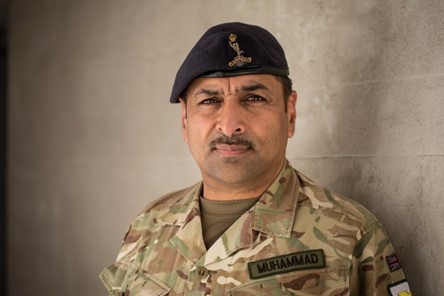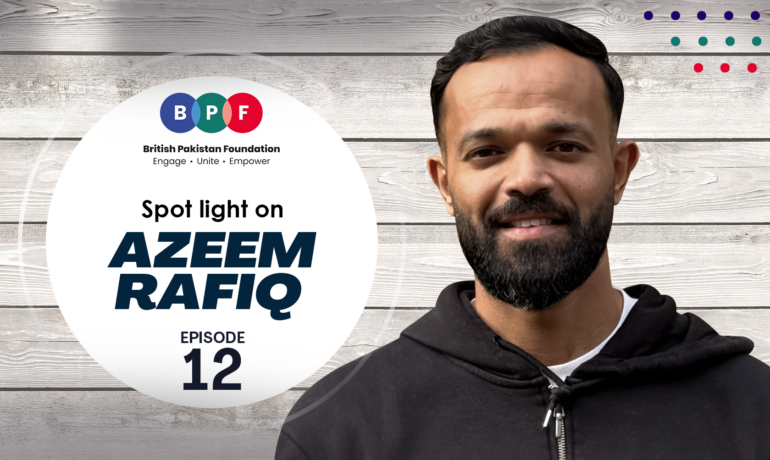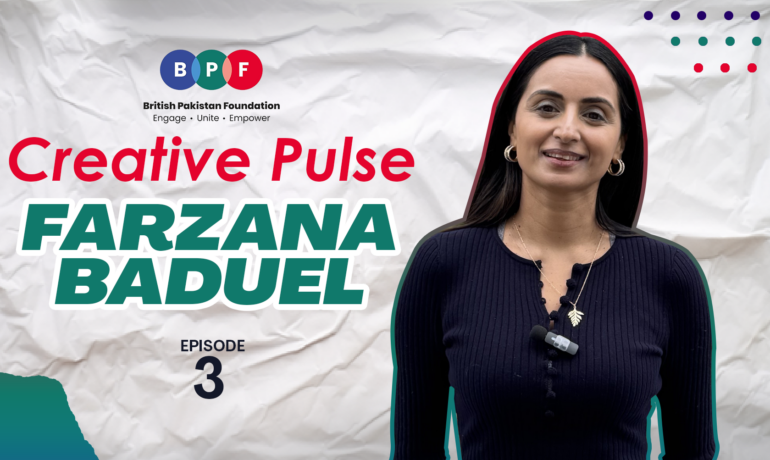Spotlight on Major Naveed Muhammad MBE
Major Naveed Muhammad MBE joined the Royal Corps of Signals Army Reserve in December 1987. Trained as a Communications Systems Operator, he held a normal mix of Squadron roles up to the rank of WO2. Commissioned in 2007, he embarked on the first of his Full Time appointments as Second in Command of the Birmingham Group of recruiting offices during which time the Group enlisted some of the highest numbers of recruits into the Regular Army.
He then undertook a tour as a Regimental Careers Management Officer of a Royal Signals Reserve Regiment prior to taking on his current role as the Army’s National Liaison Officer. This role is delivering engagement with priority communities across the UK in order to improve the understanding of the Army as well as the wider Armed Forces in order to support MoD direction to make the UK Armed Forces more reflective of society whilst delivering the right mix of Regular and Reserve Service personnel
Major Muhammad deployed on operations to the former Yugoslavia in 1996 as part of the Peace Implementation Force and then to Iraq and Afghanistan in 2003 and 2010 respectively in support of the UK’s commitments there. Major Muhammad visited Sierra Leone in 2015 during the British military’s deployment to combat the deadly Ebola virus and supported key messaging activities to ensure that the local population was able to participate effectively in eradicating the disease. He has secured two prestigious Race for Opportunity awards. Firstly for recruiting, then as Chair of the Armed Forces Muslim Association whose aim is to support personnel in the Royal Navy, Army and Royal Air Force. For his exemplary service, Major Muhammad was awarded an MBE in the 2016 Queen’s New Year’s Honours.
More recently he has been involved in Defence Engagement, working within the MoD in improving the UK Armed Forces’ reputation with strategic partner nations in Europe and the Middle East. In addition, Major Muhammad is at the forefront of engaging with BAME communities across the UK in order to ensure better mutual understanding, specifically focused around the role of the Armed Forces as well as the significant opportunities available to those who volunteer to serve.
How did you get started in your career?
Having arrived from Kenya as a 13 year old, I found myself in school with the challenges that faces many students of that age in building a friendship circle. I recall spending a little time with a fellow student who was in the process of joining the Army Cadet Force, the biggest youth organisation in the country. Hearing his stories of initial experiences of outdoor activity was really interesting and the following year I managed to persuade my parents to allow me to become an Army Cadet. I remained until my 18th birthday during which time I was able to experience a number of activities such as leadership and rock climbing, to name just a couple, whilst maintaining an ethos of discipline and camaraderie. I then found myself facing an opportunity to join the Army Reserve which I did and trained as a Communications Systems Operator. That was over 32.5 years ago! The rest as they say is history.
What is a highlight of your career?
This is one of the most difficult question for someone serving to be able to answer simply because there are so many highlights! Everything from deploying on operations, adventurous training such as skiing, travelling to many corners of the world and being awarded a military MBE. However, one particular experience which does stick out was the opportunity to embark on a three-week expedition to the Himalayas where we trekked a route in the Annapurna range at a pace which was a lot quicker than what a tourist would maintain!
It was an exciting journey isolated from society whilst relying on each other to ensure that the whole team was able to complete the route despite some challenges along the way. If anything, I feel this highlights that a career in the Army is not simply about the job you may be trained to do, it’s a lot more than that. Having said this, I would also class my role working in Army Recruiting which allowed me to interact with young women and men who were keen to begin their own careers in the Army. It was a fulfilling role in that the team and I were able to guide them whilst ensuring that whatever their ambition, we assisted them in realising their greatest potential in terms of a career in the British Army.
How would you describe the type of work that you do each day? Why is it important?
My current role as the Army’s National Liaison Officer is focused on improving mutual understanding between the British Army and the country’s diverse communities but with a focus of British Muslim communities where necessary. There are many perceptions about the Army, some not accurate and others very much supportive. Only by giving opportunities to engage in dialogue can one expect greater understanding. I often find myself in conversation at a community event (I am looking forward to the next BPF one covid-19 permitting!), a school, youth centre, Mosque or a meeting discussing my experiences as well as opportunities in the Army. Ultimately the British Army must become more reflective of British society. As such, the long-term aim is to ensure that whoever you are, there is a place for you in the organisation should you wish to join.
Helping people realise that a career in the British Army is simply not what they may have originally thought about originally is a good way to break down barriers. You could be involved in combat operations one day, on another day be in a part of the world helping build a hospital or conduct counter poaching operations to deployments here at home fighting flood, fire and disease – the British Army is a force which easily adapts to particular circumstances. It is vital that society understands the multi-dimensional role of the Army which exists to provide security for all of us against threats from other states, terrorism and environmental dangers regardless of who we are and what our thoughts about the organisation might be.
What does an average workday look like to you?
I am delighted to say that there is no average day. My role is varied and challenging but extremely enjoyable. In fact, I would go as far as to say that I don’t feel any civilian employer could give me the job satisfaction I enjoy on a daily basis. From giving presentations on my experiences as a Muslim Officer in the British Army at a school to delivering an annual Service of Commemoration where the significant contribution of Muslim soldiers from the Commonwealth who fought for Britain during WW1 and WW2 – no day is the same.
Of course, there is no getting away from the hours sat in front of a computer however I get many opportunities to see parts of the country which I have not visited before. Another part of my job is as the Project Officer to the Islamic Adviser to the Chief of Defence Staff, Imam Asim Hafiz, a role which allows me to travel extensively. In addition, I have the privilege to be the individual who coordinates annual visits by Muslims serving in the British Armed Forces to the Kingdom of Saudi Arabia in order to perform the Hajj and Umrah pilgrimages
What has been the greatest hurdle for you to overcome in your career?
There is no getting away from the fact that previous operations in Iraq and Afghanistan have resulted in particular views about the British Army becoming entrenched. Despite my full-time service since 2008 involving varied roles, I have undertaken community engagement throughout that time as an additional duty. At times, being able to access Muslim audiences has been challenging however as time goes on, more and more people have been willing to engage in dialogue and learn about personal experiences of those who serve in the Army and realise that these are ordinary men and women, including those who are Muslim, who are doing extraordinary work.
Indeed, my current experience is that more and more Muslim individuals and organisations are themselves reaching out to us with a hand of friendship rather than only us doing that. There is much more to do however there is a real desire amongst British Muslim communities to establish and nurture links with national institutions and the Army is one which enjoys a significant amount of that.
What is the best thing about your job?
The opportunity to experience things which no other employer can provide, whether that is the job itself or the additional benefits such as personal development, values and confidence. However, I would say that the best thing about my job has been the colleagues with whom I have had the privilege to work.
What are your plans for the future?
As long as the Army continues to employ me, I plan to serve until retirement and would then like to work in a capacity where I can encourage British Muslims to consider non-traditional career paths. The Army is unique in how it is able to provide social mobility and I would like to ensure that as many people as possible, regardless of their background, are able to access that opportunity.
How do you unwind?
I do the usual things like watching cricket as well as not completing DIY jobs on the list. I do enjoy sitting down with my 14 year old daughter and listen to her chatter – I wholly recommend it as a way to find out what is important nowadays!
Spotlight On Azeem Rafiq
This episode of Outstanding British Pakistanis’ features the inspiring
Creative Pulse: In Conversation with Farzana Baduel
This episode of Creative Pulse features Farzana Baduel, founder




